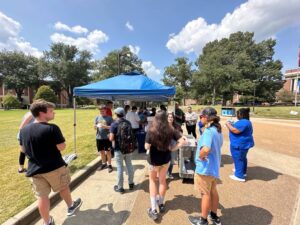Many students begin following Jesus with passion and faith. Over the course of a lifetime some discard, change directions or abandon their faith. Let’s think together about some ways to prepare students to sustain their passion and relationship with Jesus for a lifetime.
I once heard the leader of a national Christian organization make the following statement, “When I graduated from seminary, I made a list in my Bible of 25 promising ministers, most of whom were friends. These were men who exhibited faith, speaking ability and passion for Jesus. After 30 years, only a handful of these men are still active in Christian ministry.” What happened?!
This is not a new phenomenon. Jesus alluded to it in the Parable of the Sower in Luke 8 when he spoke of those who “believe for a while and depart in a time of testing” (v.13) and others (v.14) who “when they have heard, go on their way and are choked with worries, riches and pleasures of life, and produce no mature fruit.” The apostle Paul was aware of it in 2 Timothy 4:10 when he stated that “Demas has deserted me, because he loved this present world.”
So, what are some specific ideas on preparing students to serve Jesus for a lifetime?
1) Guide students to confirm that their relationship with Jesus (and accompanying passion) is genuine. It is fairly common for a student to indicate a desire to trust Jesus or make some type of public decision as a child or teenager and either not be discipled or later conclude that their previous experience was one of following their peers or a case of environmental, not genuine faith. In a variety of places, the Bible clearly states that genuine Christ followers will be known by their fruits. Jesus states this in the final portion of the Parable of the Sower (Luke 8:15) when he says, “But the seed in the good ground – these are the ones who, having heard the world with an honest and good heart, hold on to it and by enduring, bear fruit.” Likewise, in Matthew 7:20, he concludes, “So, you’ll recognize them by their fruit.” John 15 also highlights fruit bearing.
2) Teach students that spiritual warfare is real and to expect it. Jesus was intensely aware of this during his temptation (Matthew 4:1-11) and in the Garden of Gethsemane (Matthew 26:36-38) where he said, “My soul is swallowed up in sorrow – to the point of death.” Paul was clear in Ephesians 6:12 when he said, “For our struggle is not against flesh and blood, but against the rulers, against the powers, against the world forces of this darkness, against the spiritual forces of wickedness in the heavenly places.”
3) Train students to feed and nurture their spiritual life. We cannot stop times of spiritual dryness from happening in our lives, but we can prepare, recognize and mitigate the damage and consequences. We do this through interacting with God’s Word in various ways such as hearing, reading, memorizing, meditating, studying and applying it. Demonstrate for students how they can and should study the Bible for themselves or with a small group. Basic methods such as Inductive, Topical, Chapter and Book studies add variety and depth of insight which provides spiritual maturity.
Some other ways to nurture and feed their spiritual life include:
- Prayer–Prayer was foundational in the life of Jesus and his early followers. It should be no less important in our lives today. Share with them a simple outline for prayer such as CATS (Confession, Adoration, Thanksgiving and Supplication) to help them get started and incorporate prayer into their lives. I always like to ask students I am discipling to memorize Mark 1:35 because it illustrates the priority Jesus placed on beginning his day with prayer.
- Worship–Those who confess the name of Jesus are both drawn and commanded to worship individually and gather together with other Christ followers. The book of Acts is full of examples of Christian worship. In Hebrews 10:24-25, Paul encourages the believers to be faithful in worship with other Christ followers.
- Evangelism–Sharing the Good News of Jesus with people who do not yet know him should naturally overflow from the life of a follower of Jesus. It is an act of obedience to Jesus that reinforces God’s truth in their lives, trains them to defend their faith and be clear about what and why they believe.
- Disciple others–Disciple through teaching them to memorize scripture, study the Bible, evangelize and pray. Matthew 28:18-20 and 2 Timothy 2:2 highlight the necessity of making disciples who in turn disciple others.
- Fast–This spiritual discipline cleanses the body and trains us spiritually, emotionally, physically and creates godly discipline.
4) Encourage them in personal wellness. When I first joined the staff of a national mission agency, I was very surprised to see that many of my colleagues struggled physically. Health issues of various kinds prevented them from doing much of what they wanted to do in ministry. That, coupled with the death of my father from a heart attack, led me to determine that I would, to the best of my ability, not disqualify myself from ministry through poor health habits of my own choosing. The phrase from Romans 12:2, “present your bodies as a living sacrifice” took on new meaning for me! In my own life, I have resolved to do my best to eat healthily, exercise regularly, sleep appropriately and take personal Sabbaths from work as a means of pacing myself to serve Jesus for a lifetime. It is also a way to worship God through discipline and practicing the spiritual gift of self-control.
5) Help students catch a vision for nurturing their minds intellectually. Being a life-long learner is not just a catch-phrase, it is vital to all who desire to follow and serve Jesus! Though the lives of students are filled with lectures, labs, study groups and other methodologies of learning, they need to also acquire the discipline of reading short articles on topics of spiritual and daily interest. It is important to learn to keep up with news and current events and see them in the context of scripture. Finally, reading a variety of great books of different genres such as fiction, spiritual growth and biographies brings perspective and depth to their understanding of life and the world around them.
6) Students need to prepare educationally. The academic years are foundational in preparing for a vocation, but also set the course for so many other things in life. Students should see their studies as an extension of their faith and honor Jesus by being the best student they can possibly be (Colossians 3:17). Students need to recognize that studying to get an undergraduate or graduate degree in a marketable field such as teaching, business, health care or engineering is a highly desirable thing. Degrees such as these open a world of options and opportunities to share Jesus in closed countries with unreached and unengaged people groups. It also helps them relate more readily to the average lay person in the local church.
7) Students need to get all the experience in ministry they can. From my perspective, Experience is education multiplied. It could be said that the Student Team at the International Mission Board (IMB) is involved in experiential education. We have options for various lengths of service from one week to one year. During a “typical” four year course of study for a bachelor’s degree, students take courses during ten terms. We encourage every student to “tithe” their missions involvement and serve overseas at least one term during their college career. It will change their life! Information is available at www.imbstudents.org or by calling 800-999-3113 and asking for the Student Team.
Students can do things that are directly related to their academic field of service or be engaged in a wide variety of ministry experiences to share Jesus, disciple others and start new churches. We also encourage students to actively pursue opportunities for involvement and service through their local church and campus ministry.
Guest Blogger: Van Simmons is on the Student Mobilization Team of the International Mission Board and can be reached at [email protected] or 804-219-1371.





